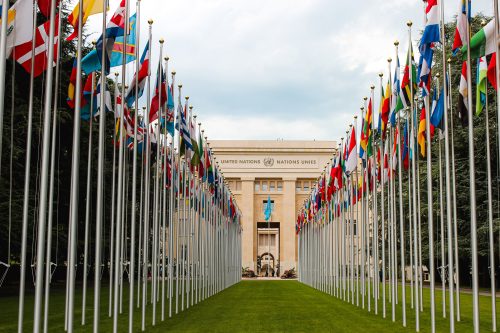National drug policies are bound by commitments to international law. The three key treaties shaping international law on drugs are:
The 1961 UN Single Convention on Narcotic Drugs
The 1971 UN Convention on Psychotropic Substances
The 1988 UN Convention against Illicit Traffic in Narcotic Drugs and Psychotropic Substances
The UN drug control conventions are binding agreements that require countries to ban the supply of controlled drugs for non-medical or scientific use. This is a primary barrier to drug policy reform at the national level. However, an increasing number of countries (e.g. Canada) are deviating from these restrictions by legalising cannabis.
What do the drug conventions say?
The UN drug conventions have two core goals: preventing the production, supply and use of specific drugs for non-medical or scientific purposes, and ensuring a limited supply of those ‘controlled’ drugs for legal use (e.g. pain relief). International systems of control over opiates, cocaine and cannabis existed before the conventions were created (starting with the ‘Hague Convention’ of 1912), but those earlier agreements were superseded by the 1961 UN Single Convention.
At the heart of the UN drug control system sits the Commission on Narcotic Drugs (CND). It is responsible for deciding on any changes to the schedules or amendments to the treaties, as well as providing policy guidance in the form of resolutions. It is made up of a rotating group of 53 member states, selected by the UN Economic and Social Council (ECOSOC). The Commission meets annually at the UN in Vienna - although ‘intersessional’ meetings also take place in between the main annual conferences.
The International Narcotics Control Board (INCB) is responsible for monitoring the implementation of the conventions, as well as for overseeing and monitoring the supply of controlled drugs for medical and scientific purposes. It is made up of 13 members selected by ECOSOC, including three from the World Health Organisation (WHO). If the INCB feels a country is failing to comply with the conventions it can ‘name and shame’ them in its annual report, and by reporting to the CND and ECOSOC. Theoretically, it also has the power to recommend sanctions, including that the CND limit the medical trade in controlled drugs; however, while this power has occasionally been threatened, it has never been invoked.
Through its statements, annual reports and private communications, the INCB has a significant influence on the general approach to global drug policy that can impact millions of people. For example, how harm reduction may be viewed, the role of human rights in drug policy implementation, or how strongly moves towards decriminalisation or legalisation may be challenged.
The United Nations Office on Drugs and Crime (UNODC) was formed in 1997 through the merger of the UN International Drug Control Program and the UN Crime Prevention and Criminal Justice Division. It is responsible for advising governments on effective enforcement of global drug laws, as well as for monitoring the global drug situation through its annual World Drugs Report. The views of the UNODC can set the tone for how global drug control is managed, and - as its name suggests - it does so largely through a focus on crime reduction, security and law enforcement, rather than the promotion of public health and human rights.
The World Health Organization is responsible for providing the core scientific evidence to the CND when it considers changes to schedules or amendments to the treaties. If rescheduling is proposed, the WHO will produce a review and recommendation through its Expert Committee on Drug Dependence. This recommendation is meant to guide the decision made by the CND. In practice however this does not always happen. Over the years, the influence of enforcement-oriented bodies such as the INCB has grown, while the WHO has been increasingly sidelined.
National governments are required to adhere to the UN conventions. In the UK, the principles of the 1961 Convention were reflected in the 1971 Misuse of Drugs Act.
The drug laws which operate in the UK today are, therefore, directly related to the principles set out in the UN Conventions.. Member States also remain bound by those conventions – which is why the decisions made at a UN level remain critical to the way national drug policy works on a day-to-day level.
Moving forward
In recent years, the UN drug control system has faced a growing existential crisis in the face of rapidly changing social and political landscapes.The 1961 convention, which remains the legal and conceptual foundation of the entire system, was drafted in the 1940s and 50s - an era in which drug consumption and markets were almost unrecognisable from today.
The legalisation of cannabis in Canada, Uruguay, Mexico, Luxembourg, Israel, the US and elsewhere has broken the consensus around global prohibition. There is now growing polarisation at the UN level between reform-oriented states (predominantly in Europe and the Americas) calling for modernisation and greater flexibility and those who continue to defend the punitive, enforcement-led focus of the conventions (including Russia and China).
As more countries reform their drug laws, the UN drug control system will need to adapt or it will collapse under the weight of its internal contradictions. It can no longer act as a brake on policy innovation or the development of laws better suited to local contexts. This is the precise opposite of the leadership role it is tasked to deliver. There are signs of change, however. The UN Chief Executives Board, which represents the heads of 31 UN agencies, has called for ‘decriminalization of drug possession for personal use’ and ‘changes in laws, policies and practices that threaten the health and human rights of people’. Change at UN level may be slow, but it is happening - and in significant part due to the concerted efforts of advocates and campaigners making the case for change.

